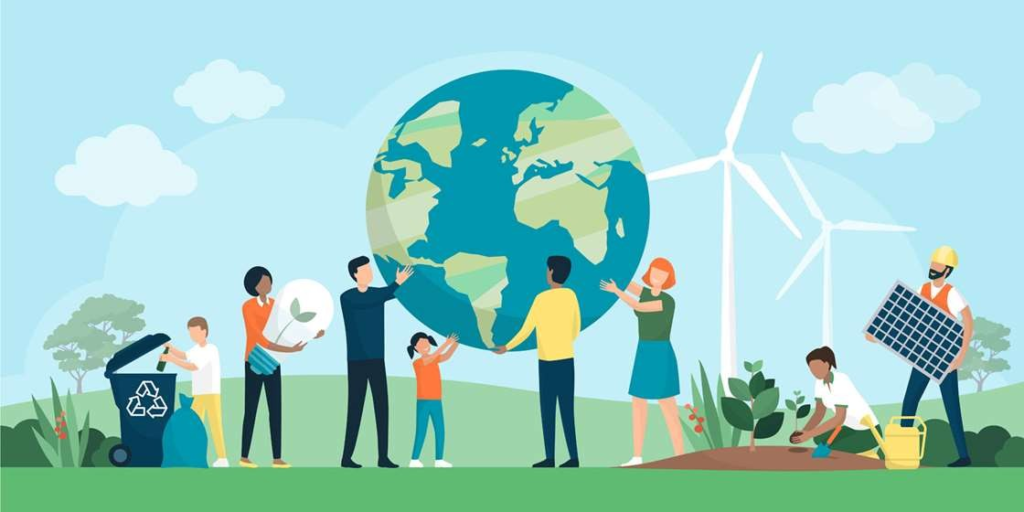Educating children about sustainable development can help shape a brighter, greener future. These essential lessons can empower our youth to become responsible global citizens and environmental stewards
By Muzamil Arif
The idea of sustainable development has become increasingly important in today’s society because it focuses on addressing present demands without compromising the capacity of future generations to address their own needs. It is crucial to teach school-age children about sustainable development as we confront serious global issues like climate change, resource depletion, and environmental degradation. We enable students to become responsible global citizens capable of building a better and more sustainable future by arming them with information and attitudes focused on sustainability. Sustainable Education Empowers Tomorrow
REALISING HOW INTERRELATED THE WORLD IS:-
Children who attend school benefit from learning about sustainable development because it helps them understand the complex web of relationships that exists within the global ecosystem. They discover the close interdependence of environmental, social, and economic elements as well as the potential impact of our current behaviours. Children can develop a holistic viewpoint and make thoughtful decisions to minimise adverse effects on the environment by recognising these links. environmental responsibility As the planet’s inheritors, it is imperative to instill in children a sense of responsibility for its preservation. They are made aware of the value of protecting biodiversity, preserving natural resources, and reducing climate change through education about sustainable development. Children may actively participate in sustainable practises including recycling, energy conservation, and sustainable consumption patterns by developing an environmental stewardship mind-set.
STRENGTHENING ANALYTICAL AND PROBLEM SOLVING ABILITIES:-
Children are encouraged to think critically and analyse complicated situations from a variety of angles through sustainable development education. They gain the ability to weigh the effects of their decisions on the environment, society, and the economy. Children who work on sustainable development-related problems gain the creativity, adaptability, and resilience necessary to meet the challenges of the twenty-first century.

GLOBAL CITIZENSHIP AND SOCIAL RESPONSIBILITY:-
Sustainable development includes social fairness and economic well-being in addition to environmental preservation. They learn the value of fairness and justice in creating sustainable societies through being taught social responsibility, empathy, and inclusivity. They recognise that sustainable development is an international endeavour and that cooperation, respect, and awareness of many cultures and viewpoints are essential.
PREPARING FOR FUTURE CAREERS:–
There is a rising need for experts in sustainable development as the globe moves towards a more sustainable future. We give youngsters the information and abilities required for the developing green economy by exposing them to sustainability principles at a young age. They can work in industries like sustainable agriculture, renewable energy, environmental management, and urban planning, improving the world while securing their own future employment.
ENCOURAGING SUSTAINABLE LIFESTYLES:-
Educating school-going youngsters about sustainable development also involves advocating sustainable lives. By teaching kids about the ecological footprint and the consequences of individual choices, children become aware of their consumption patterns and the resources required to support them. They learn about options such as sustainable transportation, organic food, and responsible waste management. Encouraging sustainable habits from an early age creates the groundwork for a generation that emphasises aware and sustainable choices, resulting to reduced environmental degradation and greater general well-being.
PROMOTING ADAPTABILITY AND RESILIENCE:-
Children who receive education on sustainable development will be better prepared to cope with the world’s rapid changes. They gain knowledge of the effects of environmental problems such as natural catastrophes, climate change, and others. Children who are aware of these risks can become resilient and adaptable, coming up with creative ways to manage and overcome such difficulties. They help create more resilient communities by becoming better equipped to deal with future difficulties.

CONNECTING CLASSROOM EDUCATION WITH PRACTICAL PROBLEMS:-
Sustainable development education goes beyond textbooks and classrooms. It emphasises experiential learning and interaction with real-world situations. Field visits, outdoor activities, and community initiatives allow youngsters to observe and comprehend the actual implications of sustainable development ideas. By connecting academic knowledge to concrete experiences, children gain a better regard for the natural world and an understanding of the need for sustainable practices.
SECURING A SUSTAINABLE FUTURE:-
In the end, educating school-age children about sustainable development is an investment in ensuring a sustainable future for future generations. By equipping kids with information, beliefs, and skills that are in line with sustainability, we create a generation that is able to take on the difficult problems of our day. These young people will go on to become scientists, entrepreneurs, policymakers, and community leaders, helping to create a world where social, economic, and environmental well-being coexist.
For the future to be sustainable, school-age children must be taught about sustainable development. We give kids the skills they need to take an active role in creating a better world by promoting sustainable lifestyles, encouraging resilience and adaptability, imparting optimism and empowerment, and connecting classroom lessons to real-world challenges.
In order for children to participate in a future that is environmentally friendly, socially just, and economically productive, it is our duty as educators, parents, and society at large to make sure they receive a complete education that incorporates sustainable development principles.
The views expressed in this article are solely those of the author and do not necessarily reflect the opinions or views of this newspaper. The author can be reached at [email protected]
Leave a Reply